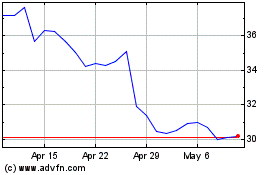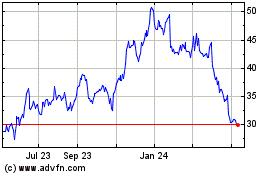Third Point Calls on Intel to Explore Strategic Alternatives -- 3rd Update
December 29 2020 - 5:51PM
Dow Jones News
By Asa Fitch
Activist hedge fund Third Point LLC pressed Intel Corp. to make
sweeping strategic changes after a year in which the U.S.
semiconductor giant suffered more product delays and lost its rank
as America's highest-valued chip company.
In a letter Tuesday to Intel Chairman Omar Ishrak, Third Point
Chief Executive Daniel Loeb said Intel's woes could threaten the
U.S. tech industry and urged the chip maker to consider
alternatives, including selling some of its acquisitions and
splitting its design and manufacturing operations -- a move that
would end Intel's long-held status as America's leading integrated
semiconductor maker.
Intel said it "welcomes input from all investors regarding
enhanced shareholder value. In that spirit, we look forward to
engaging with Third Point LLC on their ideas towards that
goal."
Third Point's demands follow years of engineering struggles at
Intel and growing competitive pressure from rivals that outsource
their chip manufacturing to factories in Asia -- including Nvidia
Corp., which surpassed Intel in market capitalization in 2020.
Intel this year pushed back production of its most advanced chips,
was dumped by Apple Inc. as the supplier for its Mac computer
processors and lost market share to former distant rival Advanced
Micro Devices Inc.
"Without immediate change at Intel, we fear that America's
access to leading-edge semiconductor supply will erode, forcing the
U.S. to rely more heavily on a geopolitically unstable East Asia to
power everything from PCs to data centers to critical
infrastructure and more," Mr. Loeb wrote in Third Point's
letter.
Mr. Loeb also said Intel should address the recent departures of
top chip designers and what he called an "increasingly demoralized"
remaining engineering staff. The letter was reported earlier by
Reuters.
Intel shares closed up 5% after Third Point's letter.
The chip maker said this year that it would consider outsourcing
the manufacturing of some of its most advanced chips. The company
is expected to decide next month where it will make future
generations of processors.
Intel has fallen behind Taiwan Semiconductor Manufacturing Co.
and South Korea's Samsung Electronics Co. in the race to make the
most cutting-edge chips. TSMC makes chips under contract for some
Intel competitors, including Nvidia and AMD.
As TSMC and Samsung gradually shrunk their transistors in recent
years, leading to higher-performance chips, Intel's strategy to
aggressively downsize its circuitry stumbled. In July, Intel said
it encountered new delays in developing its latest chip technology,
which it said was roughly a year behind its initial targets. Soon
after, it shook up its engineering team, with chief engineering
officer Venkata "Murthy" Renduchintala leaving the company.
AMD's latest generation of central processing units, or CPUs,
have eaten away at Intel's market share in PCs and servers that go
into big data centers. Nvidia, meanwhile, dominates the burgeoning
market for artificial-intelligence processing, where its graphics
chips excel.
Third Point said Intel also faces competitive threats from the
growth of custom chip-making by big tech companies like Apple,
Microsoft Corp. and Amazon.com Inc. Apple this year opted to use
in-house chips for some of its latest Mac computers, dropping Intel
as a supplier.
"You must be able to offer new independent solutions to retain
those customers rather than have them send their manufacturing
away," Third Point's letter says.
Intel shares are down more than 17% this year. Nvidia's stock
has more than doubled and AMD's shares are up almost as much.
Nvidia and AMD are using some of that investor enthusiasm to
pressure Intel further. Nvidia has agreed to buy mobile-phone chip
design giant Arm Holdings in a $40 billion deal that would be the
largest ever in the chip business. AMD said it would use stock to
buy chip maker Xilinx Inc. in a $35 billion deal.
Third Point said in its letter that Intel's board allowed
management to "fritter away" the company's advantages while paying
executives lavishly even as Intel lost more than $60 billion of
market capitalization this year.
"Stakeholders will no longer tolerate such apparent abdications
of duty, " it said, pointing to the company's loss of chip-design
talent as a top concern.
Stacy Rasgon, an analyst at Bernstein Research, said Intel was
likely already considering the restructuring ideas Third Point
proposed. He said it wasn't clear how separating the company's
chip-making operations from its chip-design unit would add value
for investors. "It doesn't fix the manufacturing problem, which is
the root of everything that's going on," he said.
Third Point recently acquired a stake in Intel worth roughly $1
billion, according to a spokeswoman for the hedge fund. The
investor said it would submit nominees for election to Intel's
board at the company's annual meeting next year if Intel were
reluctant to address its concerns, the letter said.
With its large size and growing revenues, Intel hasn't faced
major activist-investor pressure in recent years, even as some of
its peers stared down calls for change. Smartphone-chip giant
Qualcomm Inc. came under pressure from activist investor Jana
Partners LLC in 2015, which advocated breaking up the company's
chip-design unit from its patent-licensing division. The company
decided against a split, and Jana withdrew.
Despite its woes, Intel has said it expects to post record sales
this year, boosted by pandemic-era demand for PCs and cloud
computing.
Write to Asa Fitch at asa.fitch@wsj.com
(END) Dow Jones Newswires
December 29, 2020 17:36 ET (22:36 GMT)
Copyright (c) 2020 Dow Jones & Company, Inc.
Intel (NASDAQ:INTC)
Historical Stock Chart
From Mar 2024 to Apr 2024

Intel (NASDAQ:INTC)
Historical Stock Chart
From Apr 2023 to Apr 2024
